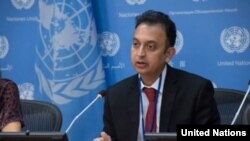A U.N. report on the human rights situation in Iran presents a bleak picture of a society living under a system of brutal political repression and rampant violations of fundamental freedoms. The report has been submitted to the U.N. human rights council.
In his presentation to the council, U.N. special rapporteur on the situation of human rights in Iran Javaid Rehman did not mince his words. He urged the International community to make Iran accountable for perpetrating what he called the most egregious violations with impunity.
"It is beyond belief that almost 18 months since the deadly crackdown against the November 2019 protests in Iran, the government has still not conducted a proper investigation nor held anyone accountable for the lethal force used against protestors, which caused at least 304 deaths," Rehman said.
Instead of investigating these crimes, Rehman noted families seeking justice for relatives killed have been threatened by state agents. He suggested the reality of life in Iran is those who are innocent are punished while the guilty go free.
He cited a long list of violations including Iran’s high death penalty rate. He noted at least 267 executions took place last year, including several children. So far, this year, more than 40 people reportedly have been put to death, many, he said on the basis of torture-induced confessions as evidence.
He expressed alarm at the continued arbitrary detention of dual and foreign nationals and the targeting of minorities, including through executions and disappearances. A major focus of the investigator’s report is on the human rights situation of women and girls, which he considered largely abysmal and unacceptable.
"While some positive steps—such as in education and in citizenship rights—are recognized, egregious gender-based discrimination persists in law, practice and societal attitudes, disempowering women and girls from participating and contributing in society,” said Rehman.
Iranian Ambassador to the U.N. in Geneva, Esmaeil Baghaei Hamaneh called the report one-sided and said it is based on disinformation.
"For more than ten years now, this particular interactive debate has been used as a platform to launch a campaign against Iran under the guise of human rights," Hamaneh said. "The way human rights is quoted are framed and weaponized by certain group of states to score points in their political campaigns against their adversary should be of serious concern.”
The Iranian ambassador said the establishment of a special rapporteur on Iran’s human rights lacks any legitimate grounds. He added it was not fair or justified and should be abandoned.




